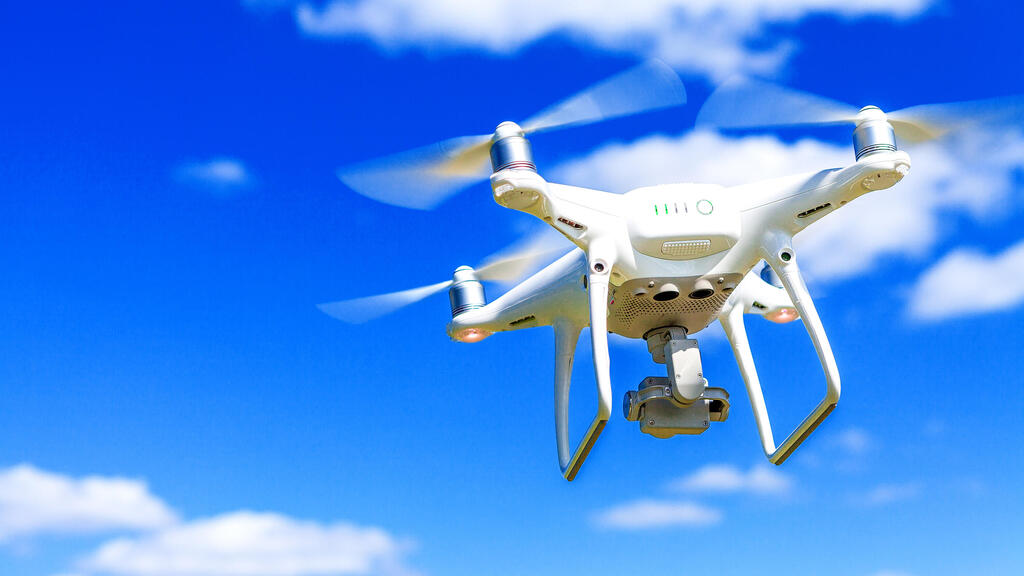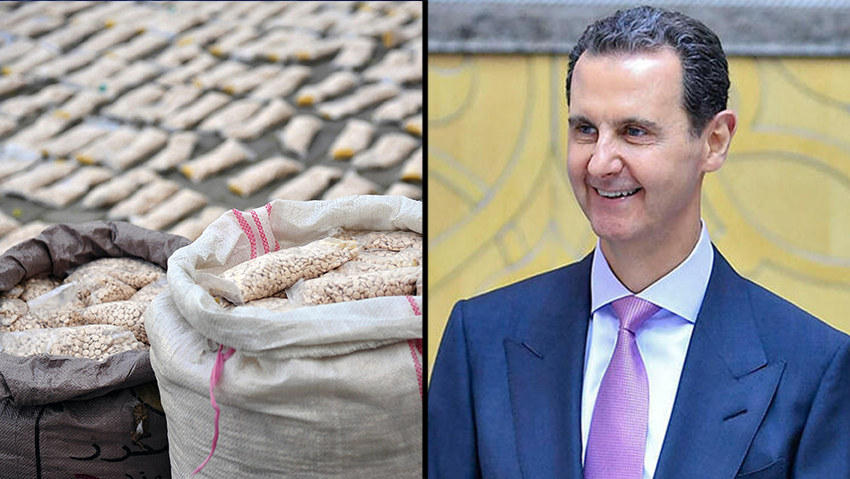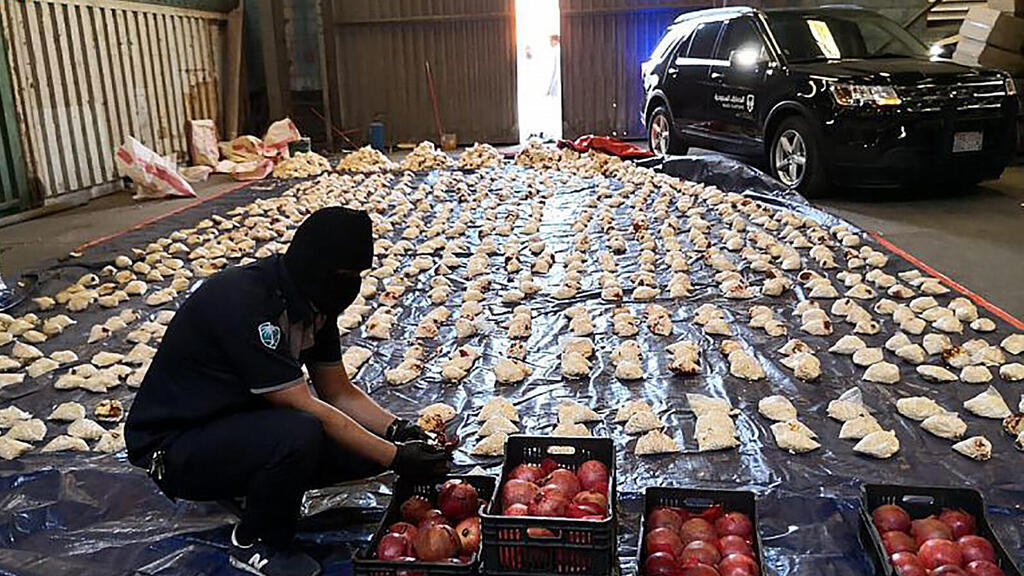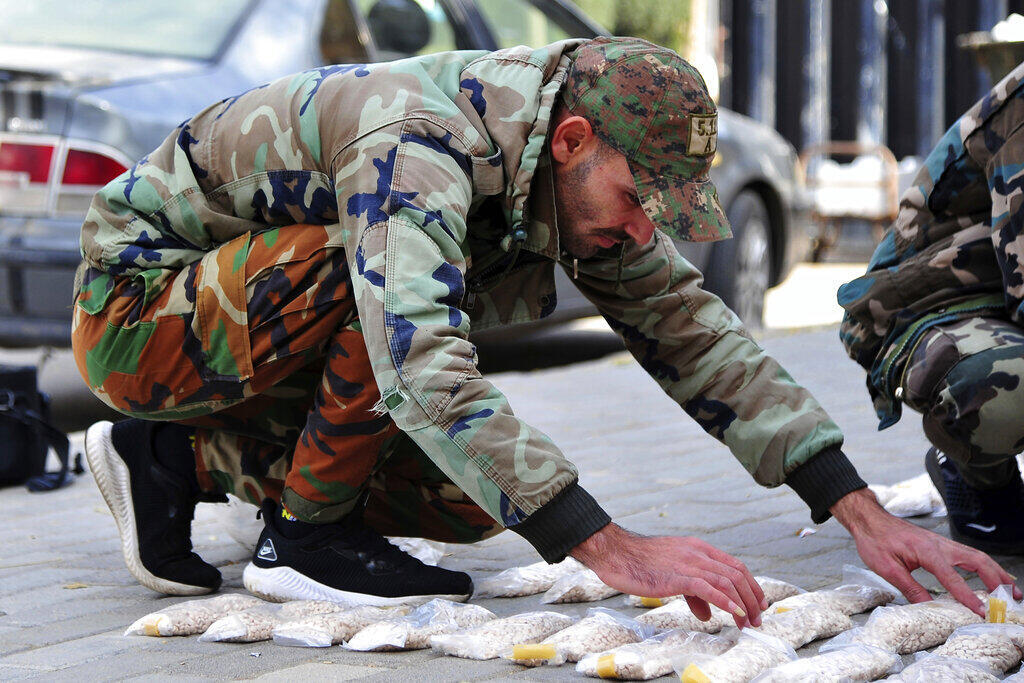The Jordanian army said on Tuesday it had downed a drone carrying drugs from Syria into its northern frontier region, and asserted that Jordan would not allow the border area to become a front line in an Iran-linked drug war.
Other stories:
The kingdom has blamed pro-Iranian militias, who it says are protected by units within the Syrian army, for smuggling drugs across its borders toward lucrative Gulf markets.
Damascus says it is doing its best to curb smuggling and continues to bust smuggler rings in the south. It denies complicity by Iranian-backed militias linked to its army and security forces.
The sharp rise in smuggling attempts has forced Jordan since last year to change army rules of engagement along the border, giving it's military the authority to use overwhelming force.
"We are continuing to deal with resolve and force with any threat to our borders and any attempt to destabilize the security of the nation," the army said in a statement.
The plane, which was carrying crystal methamphetamine, was intercepted and downed on Jordan's side of the border, it said.
War-torn Syria has become the region's main site for a multi-billion-dollar drug trade, with Jordan a main transit route to the oil-rich Gulf states for a Syrian-made amphetamine known as captagon, Western anti-narcotics officials and Washington say.
5 View gallery
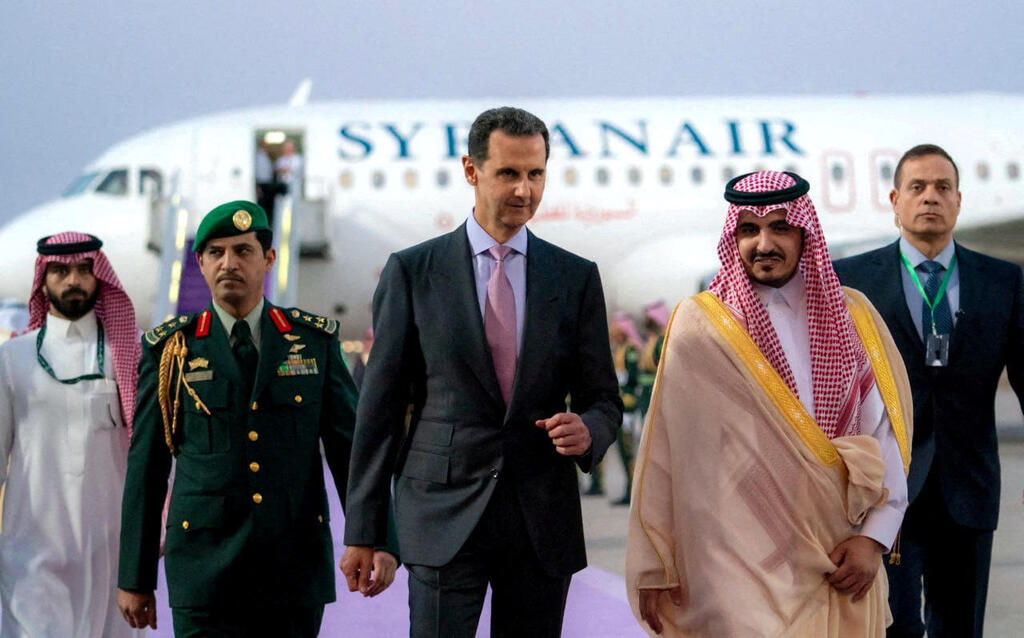

Syrian President Bashar Assad - Damascus says it is doing its best to curb smuggling
(Photo: Reuters)
Jordanian officials say they have raised their concerns with Syrian authorities, and although they have received pledges they say they have not seen any real attempt to clamp down on the illicit trade.
Amman carried out rare air strikes on southern Syria last month, hitting a Iran-linked drug factory and killing a smuggler allegedly behind big hauls across the two countries' border, local and Western intelligence sources said.
The bombing was a message to Damascus that it should not mistake Amman's resolve at the time it was involved in an Arab effort to end Syria's estrangement, officials said.
Jordan requested more U.S. military aid to bolster security on the border, where Washington has since the more than decade-long conflict began given around $1 billion to establish border posts, officials say. Jordan has a roughly 375 km-long border with Syria.
Syrian President Bashar Assad's government denies involvement in drug-making and smuggling. Iran says the allegations are part of Western plots against the country.
Hezbollah also denies involvement in the drug trade and says Jordan's allegations echo Washington's campaign to undermine Iran's influence in the region.
Meanwhile, these little white pills have given Assad powerful leverage with his Arab neighbors, who have been willing to bring him out of pariah status in hopes he will stop the flow of highly addictive Captagon amphetamines out of Syria.
Western governments have been frustrated by the red-carpet treatment Arab countries have given Assad, fearing that their reconciliation will undermine the push for an end to Syria’s long-running civil war.
But for Arab states, halting the captagon trade is a high priority. Hundreds of millions of pills have been smuggled over the years into Jordan, Iraq, Saudi Arabia and other Gulf Arab countries, where the drug is used recreationally and by people with physically demanding jobs to keep them alert.
Saudi Arabia has intercepted large shipments of pills hidden in crates of fake plastic oranges and in hollowed-out pomegranates – even pills crushed and molded to look like traditional clay bowls.
Analysts say Assad likely hopes that by making even limited gestures against the drug he can gain reconstruction money, further integration in the region and even pressure for an end to Western sanctions.
The vast majority of the world’s captagon is produced in Syria, with smaller production in neighboring Lebanon. Western governments estimate the illegal trade in the pills generates billions of dollars.
The United States, Britain and European Union accuse Assad, his family and allies, including Lebanon’s Hezbollah group, of facilitating and profiting from the trade. That has given Assad’s rule a massive financial lifeline at a time when the Syrian economy is crumbling, they say. The Syrian government and Hezbollah deny the accusations.
Syria’s neighbors have been the biggest and most lucrative market for the drug. As the industry flourished, experts say Damascus in recent years saw Captagon as more than just a cash cow.
“The Assad regime realized that this is something they can weaponize for political gain ... and that’s when production started being on a large scale,” said Karam Shaar, a senior fellow at Washington-based New Lines Institute.
Stopping the trade has been a top demand of Arab countries in their talks with Syria on ending its political isolation. Syria was readmitted last month to the Arab League, from which it was suspended in 2011 because of Assad’s brutal crackdown on protesters. On May 20, Assad received a warm welcome at the Arab League summit in Jeddah, Saudi Arabia.
A possible sign of the behind-the-scenes trade-offs came on May 8, when airstrikes in southern Syria reduced the home of a well-known drug kingpin to rubble. Merhi al-Ramthan, his wife and six children were killed. Another strike destroyed a suspected captagon factory outside the city of Daraa, near the Jordanian border.
Jordan was likely behind the strike, with Assad’s consent, say activists and experts. The strike came one day after the Arab League formally re-admitted Syria, a step Jordan helped broker.
“Assad gave assurances that he would stop the regime from supporting and protecting smuggling networks,” a former brigadier general of Jordan’s intelligence service, Saud Al-Sharafat, told the Associated Press. “For example, he facilitated the disposal of al-Ramthan.”
Jordan, he said, sees the captagon trade as “a threat to both security and communal peace.”
In public comments, Jordan’s foreign minister, Ayman Safadi, refused to confirm or deny whether his country was behind the airstrikes but said it was willing to take military action to curb drug smuggling.
Arab states, many of which had backed the rebels trying to oust Assad, say they share the goal of pushing him to make peace. Ahead of the Jeddah summit, Jordan hosted a meeting of top diplomats from Syria, Saudi Arabia, Iraq, and Egypt, and the long agenda included setting a roadmap for peace talks and the return of millions of Syrian refugees.
But it was on captagon where the gathering made the most progress. Syria pledged to clamp down on smuggling, and a regional security coordination committee was agreed on. Days later, Syrian state media reported that police quashed a captagon smuggling operation in the city of Aleppo, discovering 1 million pills hiding in a pickup truck.
Jordan has intensified surveillance along the Syrian border in recent years and has raided drug dealers. Jordanian troops killed 27 suspected smugglers in a fierce gun battle in January.
Smuggling routes have made untangling drug networks more difficult. A member of an Iraqi militia told the AP that militias in Iraq’s desert Anbar province, which borders Syria, Jordan and Saudi Arabia, have been crucial for captagon smuggling. He spoke on the condition of anonymity because he was not authorized to talk to the media.
Syrian lawmaker Abboud al-Shawakh denied the government profits from the drug trade and insisted authorities are trying vigorously to crack down on smuggling.
“Our country is used as a regional transit route as there are border crossings out of the state’s control,” al-Shawakh told the AP. He alleged that only armed opposition groups are involved in captagon dealing.
Syrian opposition groups are believed by many observers to have some involvement in drug smuggling. Western governments, however, accuse Assad’s relatives and allies of a direct role in captagon production and trade and have imposed sanctions on a string of individuals close to Assad.
While Assad may be willing to move against some parts of the drug trade, he has little incentive to crush it completely without winning something in return from Arab states, al-Sharafat said.
A Saudi official denied reports that Riyadh had offered billions of dollars to Damascus in exchange for a crackdown. But he added that whatever the kingdom might offer Syria would be less costly than the damage that captagon has caused among Saudi youth. He spoke on condition of anonymity in line with regulations.
The U.S. and other Western governments fear that the Arab states’ normalization with Syria undermines attempts to push Assad to make concessions to end Syria’s conflict. They want Assad to follow a peace roadmap outlined in U.N. Security Council Resolution 2254, passed unanimously in 2015, which calls for talks with the opposition, rewriting the constitution and U.N.-monitored elections.


